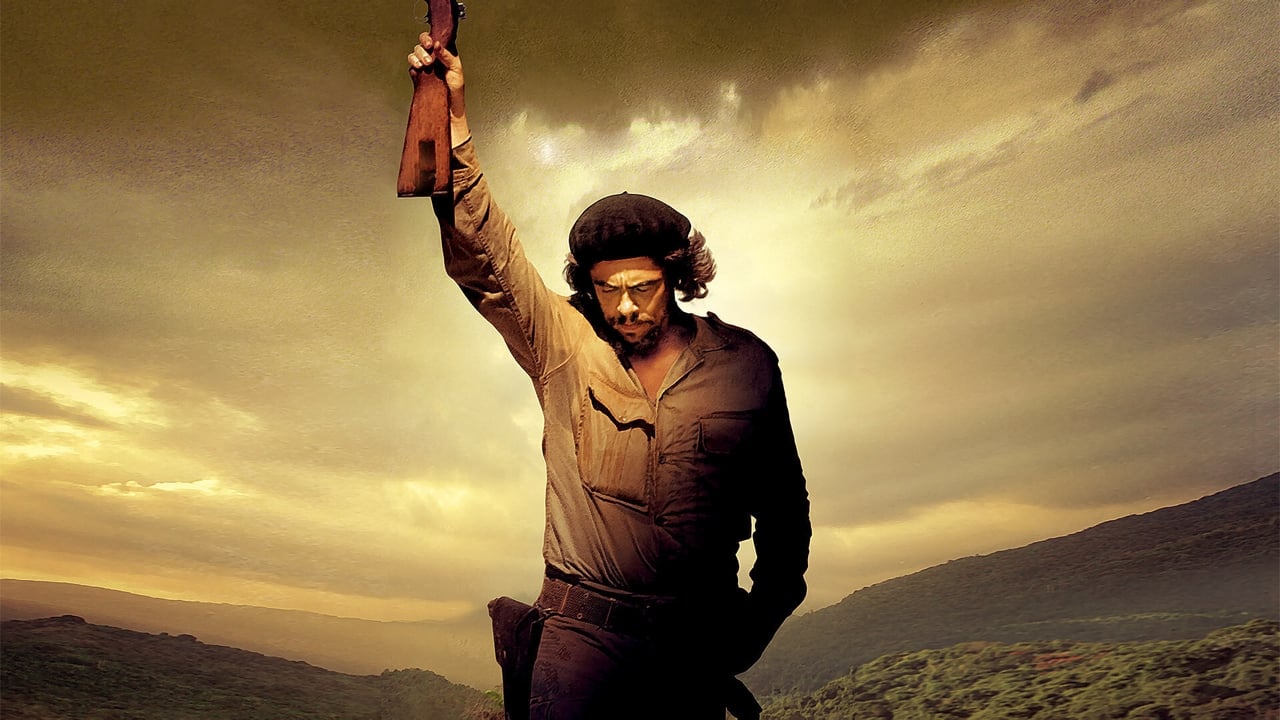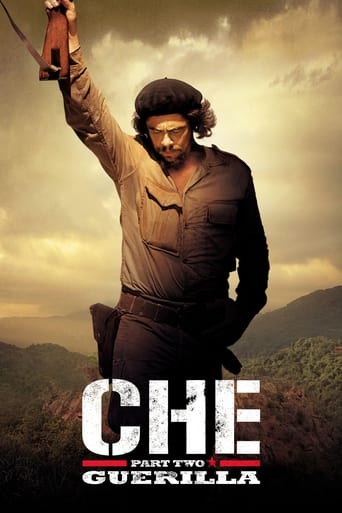2hotFeature
one of my absolute favorites!
Protraph
Lack of good storyline.
Tyreece Hulme
One of the best movies of the year! Incredible from the beginning to the end.
Philippa
All of these films share one commonality, that being a kind of emotional center that humanizes a cast of monsters.
ma-cortes
Overlong and a little boring followup about Che's existence in the Bolivian jungles in which Ernesto Guevara leads a small partisan army to fight an ill-fated revolutionary guerrilla war in Bolivia, South America . While the first installment was set in 1956, when Ernesto 'Che' Guevara and a band of Castro-led Cuban exiles mobilize an army to topple the regime of dictator Fulgencio Batista , this second part was set in 1967 , Bolivia . Here Che has to confront sad happenings about his few supplies and troops , his failing health, and a local population who widely does not share his idealistic aspirations . As the US supported Bolivian army prepares to defeat him , Che and his surrounded guerrilla fight the increasingly hopeless risks . This biographic picture contains thrills , interesting political deeds , shootouts , wartime scenes and historical events . Che, El Argentino (2008) and this film were screened combined at the Cannes Film festival 2008 under the title "Che" . Terrific acting by the main starring , Benicio Del Toro as the mythical historic figure . For his role, he spent seven years researching Guevara's life . Although Benicio Del Toro was always considered the absolute first choice to headline this film , Val Kilmer was considered as a secondary option to play Argentine revolutionary Che Guevara if Del Toro had not been available. Suppport cart is frankly excellent , plenty of Spanish actors who give splendid interpretations such as Jordi Molla , Ruben Ochandiano , Yul Vazquez , Oscar Jaenada , Carlos Bardem , Elvira Minguez , Eduard Fernández , Pedro Casablanc , Luis Callejo , Antonio de la Torre , among others . And brief appearance from Matt Damon and Lou Diamond Phillips . Very good photography by the same Steven Soderbergh , as usual , being the first feature-length movie to be shot with the Red One Camera . Evocative as well as atmospheric musical score by the Oscarized Alberto Iglesias . The motion picture was professionally directed by Steven Soderbergh , though Terrence Malick originally worked on a screenplay limited to Guevara's attempts to start a revolution in Bolivia ; when financing fell through, Malick left the project, and subsequently Steven agreed to direct the film .The movie is well based on historical facts , these are the followings : On November 3, 1966, Guevara secretly arrived in La Paz on a flight from Montevideo under the false name Adolfo Mena González, posing as a middle-aged Uruguayan businessman working for the Organization of American States . Three days after his arrival in Bolivia, Guevara left La Paz for the rural south east region of the country to form his guerrilla army. Guevara's first base camp was located in the mountain dry forest in the remote Ñancahuazú region . Training at the camp in the Ñancahuazú valley proved to be hazardous, and little was accomplished in way of building a guerrilla army . The Argentine-born East German operative Haydée Tamara Bunke Bider, better known by her nom de guerre "Tania", had been installed as Che's primary agent in La Paz . Guevara's guerrilla force, numbering about 50 men and operating as the ELN ( "National Liberation Army of Bolivia"), was well equipped and scored a number of early successes against Bolivian army regulars in the difficult terrain of the mountainous Camiri region during the early months of 1967. As a result of Guevara's units' winning several skirmishes against Bolivian troops in the spring and summer of 1967, the Bolivian government began to overestimate the true size of the guerrilla force. But in August 1967, the Bolivian Army managed to eliminate two guerrilla groups in a violent battle, reportedly killing one of the leaders. As Guevara's plan for fomenting a revolution in Bolivia failed for an array of reasons . Then Che's guerrilla running out of provisions and medicines . On October 7, 1967, an informant apprised the Bolivian Special Forces of the location of Guevara's guerrilla encampment in the Yuro ravine . With apparent American help, the army is soon onto Che, so now we see Che hunted down, the local people are unhelpful and there's a desperate hunt for food . So he has to go wandering in yet more jungle and in familiar territory, more often having to hide from search aircraft , and while being slowly encircled until his caught, after being shot in the thigh . On the morning of October 8, they encircled the area with two battalions numbering 1,800 soldiers and advanced into the ravine triggering a battle where Guevara was wounded and taken prisoner while leading a detachment . Guevara was tied up and taken to a dilapidated mud schoolhouse and then Bolivian President René Barrientos ordered that Guevara be killed. The executioner who volunteered to kill Guevara was Mario Terán, a sergeant who had personally requested to shoot him because three of his friends from B Company, had been killed in an earlier firefight with Guevara's band of guerrillas. To make the bullet wounds appear consistent with the story that the Bolivian government planned to release to the public, Félix Rodríguez ordered Terán not to shoot Guevara in the head, but to aim carefully to make it appear that Guevara had been killed in action during a clash with the Bolivian army .
Bento de Espinosa
I'm totally critical of all kinds of ideologies and 100% against personality cult. I have my own opinions and know what is good and bad in both capitalism and communism. One may dislike or even hate Che Guevara, who also executed people, but he'll have to acknowledge that he was very courageous and sincerely motivated to help poor people get a better life. This can't be said about people like Lenin, of course.I found Part Two better than Part One, with more tension, but probably because when you know a story is not going to have a happy ending, then it's even more interesting. The movie as a whole is "only" good, but with del Toro's very convincing performance, it comes close to being excellent.
meeza
It surprises me that I actually got the courage to watch the bio flick or flicks "Che: Parts 1 & 2". Why? Because if my Cuban exile parents would ever found out I saw this movie about this despicable mass murderer of the Cuban revolution, I would be grounded for life. Hey wait? I am an adult, they can't ground me no mas. Director Steven Soderbergh, and newbie commie (sorry Steven, but I had to take Soder shots here) divides the movie in two partes on Commander Ernesto "Che" Guevara's revolutionary life. "Che: Part 1" presents how Che in the mid 1950's joined Fidel Castro's guerilla crew in their revolutionary quest to overthrow Cuban President Fulgencio Batista's regime; which as we all know was a revolutionary success for them, but a gargantuan guerilla disaster to many Cubans as it revolted into Communism. "Che: Part 2" presents Che trying to revolutionize the T-Shirt industry by pitching T-Shirts with his appalling bearbado face to T-Shirt manufacturers. OK, I am che-chatting a lot of crap towards your way! I meant to say the 'Che: Part 2" focuses on Che in the late 60's trying to bring back the revolution, this time to a poverty-stricken Bolivia, but with far different results. In fact, Che ended up being dead meat enchelada when he was captured and killed by the Bolivian militia in 1967. Soderbergh does not include the in-between time of those two instances in Che's life when he commanded the despicable La Cabana Fortress Prison in Cuba, where he mass murdered many Cubans who opposed Communism. That is where I think Soderbergh executed a cinematic injustice by not showing the viewers how atrocious Guevara really was. I did decide to see "Che" in hopes that Soderbergh would not glamorize him, but instead present how disturbed he really was. Unfortunately, Soderbergh did not do the latter and sadly decided to present Guevara as a Revolutionary hero, which he was not. He was a sick man who thank God is now probably at the bottom of the devil barrel. Now, I do have to be an objectivistic reviewer and must admit that Benicio Del Toro's performance as Che was extremely commanding, and worthy of merit. And that Demian Bichir was a haunting dead-ringer as Fidel Castro in his meticulous performance. But the rest of the cast of "Che" was primarily comprised of mediocre performances of actors portraying Guerilla soldiers. And as much as I do admire Matt Damon, why did Sodebergh throw him in the revolutionary mix in a Spanish-speaking cameo performance portraying a Bolivian delegate? Soderbergh did not have to present this biopic which is mostly "too much talk and not enough action" in 4 hours and 30 minutes. We have had too much of Che already, even posthumously with those ridiculous t-shirts, so why give us too much more of him? But I guess when you have the Del Toro by the horns (as you did here Steven), I guess it is your saving grace for not totally executing "Che: Parts 1 &2". *** Average
david-greene5
Having just completed a viewing of both parts one and two of this lengthy film (and I really like lengthy films if they are good), I feel that a great many of the artists involved in its making, both cast and crew, did a lot of admirable work. Somehow, the whole thing held my interest fairly well; however, the big problem with the film lies with the long shot. The director chose to keep his camera at a considerable distance from his subjects, eschewing the occasional close-up altogether too often for my taste. This stylistic choice is symbolic of the biggest flaw in the film. We see the great ordeal that Guevara underwent for his beliefs, and the nobility of his unflagging commitment to his crusade clearly presented here. The problem lies with the emptiness of sitting through so much footage without ever being allowed enough "closeness" to the principal characters to get a feeling of connection with them. From what I have read, Che was a very complex, intelligent fellow. I would have liked to get to know him a little bit, but this film seemed to be so much about his deeds, and so little about what distinguished him as a person that I am surprised when some of the comments on this site suggest that their authors felt that some depth of character was conveyed. In the end, I feel as though I just saw endless hours of newsreel footage. It was a very chilly, impersonal experience. Noting that as gifted and capable an artist as Benicio Del Toro was not only the star, but the producer, I have to commend him for resisting all temptation to give his portrayal any of the kind of stylistic flourish that distinguishes star performers. Unfortunately, this contributed to the distance at which the whole movie keeps us from a feeling of personal involvement with the protagonist. If Soderberg's sole purpose was to convey a sense of the magnitude of Guevara's struggle and sacrifice, he succeeds in this. Sadly, I feel the whole vast production could have offered us a much richer human experience. As hard and inflexible as a revolutionary's commitment to his particular ideology, this movie builds up a brick wall which consistently denies us any intimacy with its subject.

